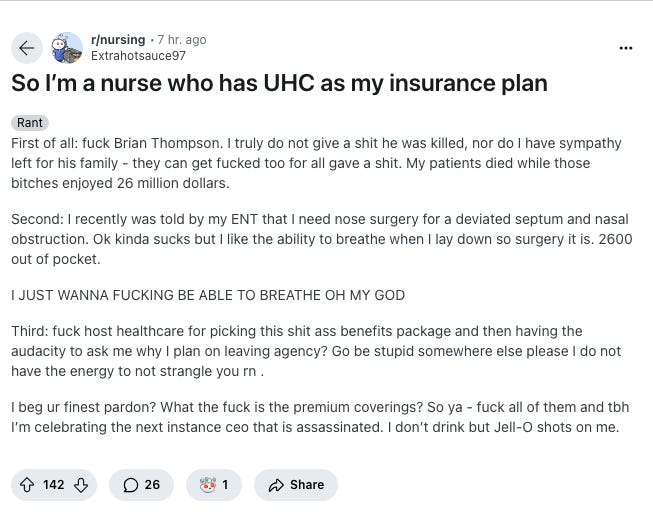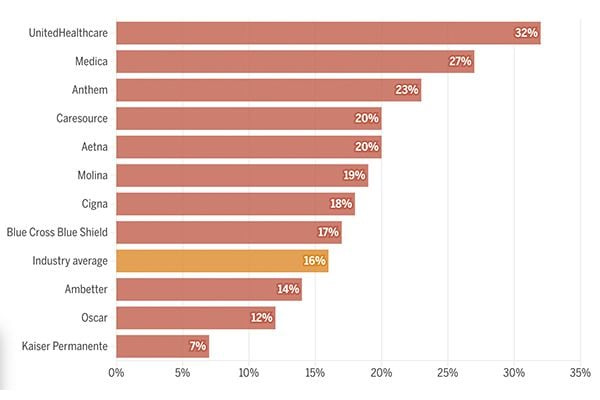Death of a Salesman
On the morning of December 4th, at 6:45 AM, Brian Thompson, CEO of United Healthcare, was murdered in Times Square as he was on his way to a shareholder meeting. At the time this is being written, the identity of the killer is unknown, and the motive yet to be definitively determined. However, much speculation has emerged around words written on shell casings left at the scene- “deny,” “defend,” and “depose.” These terms echo what trial lawyers have labeled basic insurance company tactics to avoid paying claims- “delay, deny, defend.” In other words, it seems the killer may have been motivated by revenge for some wrong done to him, perhaps a denied claim on his or a loved one’s behalf, which caused him to seek out and kill Thompson as an act of retribution.
This information has in turn led to some social media unpleasantness. Thompson’s death was roundly mocked on X, with people claiming to need prior authorization for thoughts and prayers. The sentiment united people across the political spectrum, with both left and right offering little sympathy. Little of this was directed at Thompson specifically, but rather, at the industry he represented. Americans hate health insurance companies, and the thought of the CEO of one of the biggest getting his ultimate comeuppance at the hands of some imagined father of a sick child was quite emotionally satisfying to many.
It is important, as always, to avoid jumping to conclusions. There are plenty of reasons to kill a wealthy and powerful business executive that don’t involve personal retribution. At the time of his death, Thompson was estranged from his wife, becoming CEO of United just after the split (but not divorce), and therefore having come into a great some of money just as his marriage was unraveling. Thompson was also facing a lawsuit for insider trading. With Donald Trump and Republicans coming into power in a few months, who knows what other unpleasantness might have been uncovered?
Americans like to imagine that we live in a free market economy where businesses rise and fall according to the whim of the harsh but ever-just invisible hand of capitalism. The truth is that we are dominated by just as much of a corporatist oligarchy as Russia or China. Big business and big government are symbiotic creatures, feeding off of each other to the point where the boundaries between them are indistinguishable. This is the managerial state, the political manifestation of neoliberalism, and behind the façade of democratic pieties lies a ruthless caste of mandarins who are just as jealous of their privileges as any Soviet nomenklatura. They might not fully understand the power of insurgent right populism that they face but they must somewhat grasp that the public is increasingly disinclined to tolerate abuse from their betters. If one of them got a bit too greedy and proved a bit too undisciplined in his personal habits (DUI in his late 40s) to be trusted with keeping secrets, perhaps it wouldn’t be too great of a task to pin the killing on some never-to-be-found killer with a sympathetic motive.
Law enforcement is taking the crime very seriously, publishing photos of the alleged killer. It seems he had been in New York for over a month, staying at a hostel (I didn’t know they had those in America) having travelled from Atlanta. A photo that is already becoming a meme has him smiling at a clerk at the hostel as he flirted with her.
The Gen-Z Unibomber
Thompson had been receiving death threats at his former home in Minnesota for years prior to his actual death. If this suspect is indeed caught, there will presumably be a trove of online data connecting him to at least some of those messages, though questions will naturally remain as to whether any of those are legitimate. Law enforcement, especially federal law enforcement, is profoundly mistrusted by the public as a whole, and seen as merely a part of the wider corrupt oligarchy of which the health insurance industry is another appendage. Whatever happens, a significant segment of the population will adopt a counter-narrative out of a well-conditioned reactive tendency.
Perhaps this is why so many have settled on the claim-denial-revenge motive and have moved past the particulars of this specific crime to wider questions about justice. A lot of people are quite happy Thompson was killed. They don’t have anything against him personally; few Americans could have told you his name or job title before he died. They are glad, rather, that a blow of some kind was struck against something they hate and against which they feel powerless. It’s the same emotional drive that led so many people to support Donald Trump for president (and Obama before him). Large swaths of the population despise the system under which they live and long for any opportunity, direct or vicarious, to fight back against it.
Health insurance premiums are my single biggest expense- by far. I have a good job with above-average benefits, but despite that I shell out around $1,500 a month to cover a family of four. Granted, I have taken the more expensive of the two options offered to me, but were I to have chosen the cheaper one it would still cost around $1,200. For this, I still pay a $2,500 deductible and will have to hand over $500 to visit an emergency room even if that’s paid up- another $500 to go there in an ambulance. And despite paying all of that money, if one of my girls (God forbid) were to get seriously ill, I know that it would bankrupt me. I probably earn around $100,000 a year from all of my jobs, and I would be back living with my mom in middle age were my family to experience a serious health crisis.
I watched what happened to my wife’s grandmother before she passed. Wholly bedridden and needing constant care and medication monitored hourly, the hospital continually pressured my wife to take her home anyway. When we protested that we didn’t have the means to care for her there, and that moving her in any case would amount to cruelty, the system was unfazed. This wasn’t heartlessness on the part of the doctors, but the result of the health care system being swallowed up by private equity, parasites determined to drain whatever wealth they can from productive and useful enterprises. They’re of a piece with the insurance companies, each one trying to squeeze more wealth out of desperate people. The government- which as noted is not meaningfully different from industry- had previously told us that if we wanted to put her in an assisted living facility, paid for by Medicare, that we would need to sign over her house to the state, as she wasn’t considered poor because of the home her late husband had left her. Had we done so, rather than move her into our two-bedroom apartment with two small children, that house would have been no doubt auctioned off to some connected investor and rented out to someone with a section-8 voucher.
In the end, we were greatly helped by a sympathetic doctor, who basically kept diagnosing her with conditions she didn’t have so that he could justify not discharging her. Human kindness won out over institutional greed. But the experience naturally left me, and no doubt millions of others, with a smoldering rage at the cruel indifference of the system. My wife, the apolitical sort, has never been the same.
I’ve seen people argue that the right is sympathetic to the dead CEO; that hasn’t been my experience, online or in real life. People my age especially, who grew up propagandized with right-libertarian platitudes about the corrective power of laissez-faire, have matured into men and women who’ve lived through the realities of deregulation, industry consolidation, and regulatory capture. It’s quite unfair to single out insurance. The entire global neoliberal order is one just exercise in rent-seeking. From contractors in Ireland earning fortunes putting up illegal immigrants while housing prices skyrocket for ordinary people, to the American universities that have made themselves the de-facto and very expensive accreditation department for the middle class, to the entertainment industry that leases us the stories we used to be able to own, and on and on- it’s rotten all the way through. The invisible hand is quite visible, it’s a fist, and it’s squeezing you. Right and left can both see that.
This is all a great moral and social evil, one which begs the question of the immediate incident. Is there any way that the murder of this CEO could be justified? The short answer is no, on neither ethical nor practical grounds. It’s true that in Christian terms it can be argued that Brian Thompson’s business ethics left much to be desired. He profited from denying claims on the service he sold, far more so than any of his competitors.
St. Basil the Great said plainly that a man with an extra coat in his closet, watching his neighbor shiver in the cold, is a thief. John Chrysostom, in his sermons on wealth and poverty, likewise notes that riches not put to their proper use amounts to a crime. It is not enough to merely avoid using money for immoral purposes. All men have a positive duty to use their assets for the betterment of all. Material bounty, like intelligence or physical strength, marks us out as unequal in our earthly lives, but at the same time makes us with those gifts more accountable than others. Lazarus being kicked out of his sickbed resulted in the Rich Man earning $10 million dollars the year before his untimely end.
But of course, nearly all of us fail that test. If Thompson deserved death for not using the wealth he’d acquired properly, so would most of the population. One might argue that he was uniquely evil, but that is doubtful; his behavior, as previously noted, is the norm for the system. This is where his killing likewise fails to achieve anything positive on purely practical grounds as well. After the board of directors sends a tasteful flower arrangement to Thompson’s family they’ll quickly hire a new CEO no different (but perhaps better guarded) than his predecessor. Killing Thompson was a personal moral evil that did nothing to advance the cause of justice.
In the end, that’s what $10 million buys you.
There’s a bigger question here as well- is there such a thing as a recourse to natural justice? Can a system get so dysfunctional and degraded that people have the right to take the law into their own hands? Quite so, and in fact that notion is a part of the Western, Christian legal tradition. In the Justinian Code one finds this gloss on a law from the joint reign of Valentinian, Theodosius, and Arcadius:
3.27.1. Emperors Valentinian, Theodosius and Arcadius to the Provincials. We grant everyone the right to resist a soldier or a person in private station who enters fields as a nocturnal plunderer, or besets frequented roads with intentions of robbery, and who is worthy to be subjected to immediate punishment pursuant to such permission and to receive the death and incur the danger which he himself threatened. For it is better to forestall, rather than to punish the deed. We therefore grant you permission to avenge yourself and make an act which is too late to be punished in court subject to this edict. Let no one spare a soldier when he becomes a robber and should be opposed by weapons. Given July 1 (391). C. Th. 9.14.2.
Per Roman tradition, and the tradition from Romans (13:4), sovereigns are chosen by Heaven as their instruments of justice on Earth. However, under circumstances where they are unable to exercise that power, it devolves to the people, who are authorized to execute wrath on wrongdoers themselves without fear of later legal jeopardy. The permission to do so is here granted explicitly by the emperors, but the underlying principle would necessarily apply even if such direct authorization was not forthcoming; indeed, it is easy to envision circumstances when it would not be so, given some crisis where legitimate authority could not make its will widely known.
Are there therefore circumstances wherein it is appropriate to take the law into our own hands and exercise natural justice? Certainly. Was this one of those? No. Our system, while certainly dysfunctional and corrupt, has not yet exhausted its capacity for reform and responsibility. The election of Donald Trump, a comeback for the ages against all odds and several attempts to kill him, demonstrates that the Mandate of Heaven has in some way shifted from the current regime. Thoughtful men have a duty to allow this new political settlement a chance to make its will felt before resorting to anything so drastic as violence.
This is not to say that the unfortunate end of Mr. Thompson might not have some salutary effects. Much as Scripture teaches us that calamities and wicked men can serve God’s ultimate purpose, it’s not out of the realm of possibility that the sense of self-interest that powers capitalism might have some wealthy and powerful people looking over their shoulders, aware as they have not been before of their mortality and vulnerability. Perhaps they’re even now being shocked into awareness that there are risks and costs they did not previously factor into their business decisions, factors that have less to due with numbers on a spreadsheet than their being spread on the street. This isn’t callousness; I really believe that the neoliberal fetish for numbers, what Guenon rightly called the “reign of quantity,” dehumanizes us, and that bringing back that element of personal skin in the game might prove helpful all-around.
Is there a better way forward? Yes, and, like most meaningful improvements, it involves looking to the past. For the first three centuries of its existence, the Church was an illegal and persecuted institution. Having recourse only to each other, and in service to God’s commands, they set up networks of public hospitals, orphanages, and public kitchens that cared for them and, eventually, for others. Father Demetrios Constantelos’ masterful study, Byzantine Philanthropy and Social Welfare, describes the evolution of the charitable networks created by early Christians, many of which were administered by wealthy widows like Chrysostom’s friend St. Olympias. Peter Brown’s Through The Eye of A Needle further explores how early Christians dealt with how to dispose of wealth through charitable institutions. They were so good at this that it led the pagan Emperor Julian to complain:
For it is disgraceful that, when no Jew ever has to beg, and the impious Galilaeans [Christians] support not only their own poor but ours as well, all men see that our people lack aid from us.
It is quite simply a scandal that in a country of tens of millions of practicing Christians that anyone should have recourse to secular hospitals or insurance in the first place. The Christians of America have more wealth than any people who’ve ever lived on Earth, and as such, we carry the special obligation to care for the sick and the poor even more so than our ancestors. Can our rich not do better than Jakob Fugger, who left a financial legacy that still funds care homes five centuries after his death? It’s fine to go the Philistines to sharpen your knives, but perhaps not our scalpels.
As the mood shifts in our country we believers have an opportunity to re-evangelize the American people, not merely through words, but actions. Let us make a collective covenant that no one will suffer want as a result of sickness, fund Christian hospitals and health care, and preach through charity rather than appeals that are merely cultural and political. Christians have done much recently with education, building successful schools and homeschool programs that are superior to what the world of secular liberalism offers. We can build on that success, and the networks of money and patronage developed toward those ends, and reimagine healthcare as well. It’s far more productive and godly than shooting people.
If you want to make a difference right now, I encourage all of my readers to support St. Jude’s Children’s Hospital. They are famous for never turning away a family in need. I’ve seen pediatric cancer up-close; its a horror I hope never to bear again, and the people at St. Jude’s can never receive enough gratitude and donations. If any of you are especially wealthy, I urge you to give according to your greater means, but even the most humble of us have something to offer. I’ve added a button with a link to donate to them. If you want to do something especially kind, donate in the name of Brian Thompson; your prayers and charity will do more for him now than all the money in the world.
Source: The Library Of Celaeno




Comments
Post a Comment